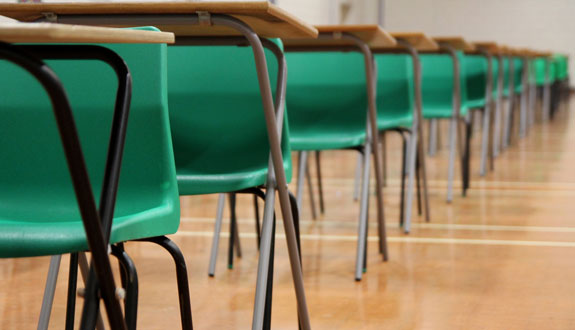The process of Law School Admission Test preparation (ok, we’ll just call it LSAT prep), can be tough. From looking for an LSAT tutor to wondering what LSAT score is needed for scholarships to your dream law school, it can be a lot. One obstacle that some people may run into when looking to take the LSAT is submitting an LSAT accommodations request.
If a test accommodation sounds like something you may need when taking the LSAT, here’s your guide to finding out if you qualify for accommodated testing, and how to apply for a Law School Admissions Test accommodation.
Applying for Accommodations on the LSAT
What Accommodations Are Offered?
Because of the LSAT’s new-ish digital format, there are some features built into the LSAT platform that the Law School Admissions Council (LSAC) believes might be useful to students with a learning disability. There is no need to request an accommodation for these features.
The software allows, for example, students to increase the size of the text on the test, as well as to adjust the space between lines. In addition to this built-in software, LSAC notes that all test takers are welcome to use “external computer programs to make web content accessible, such as keyboard-controlled screen reading software, screen magnification programs, or voice recognition software.” Just make sure that you practice using these tools on the LSAC interface before your test date to ensure it works as you expect it to.
If you think you need accommodation outside of what’s listed above, no worries! There is a large list of possible accommodations, individualized to the case of each test taker. Some examples include:
- Extended time on your test date
- Additional breaks between or during test sections
- Permission to read aloud
- Accommodation for visual impairment (magnification or braille)
- Tactile manipulatives
- Use of a human reader and/or scribe
Who Qualifies for LSAT Accommodations?
LSAC takes its requirements for testing accommodation incredibly seriously to make sure that nobody is getting an unfair advantage. They lay out exactly what you need to do to get a test accommodation on their accommodation page.
Some common examples of conditions, disorders, and impairments that could qualify for accommodations are:
- Visual or hearing impairments
- Neurological conditions
- Learning disability
- Physical or medical conditions
- Psychological condition
Having your disability diagnosed is necessary, but it is not enough to guarantee accommodation. The diagnosis must be recently updated (within the last five years) by a qualified professional, and you must demonstrate that the disability is severe enough that your aptitude on the test will only be accurately measured with accommodations. It is also helpful to have evidence of past accommodations, either for standardized tests or in the classroom.
Taking the LSAT With ADHD
Requesting LSAT accommodations for ADHD is very common. If you have been diagnosed with ADHD and require extended testing time, keep in mind that LSAC will review your application rigorously. Previous accommodations for extended time can support your request, and an ADHD diagnosis received during childhood may hold more weight than a recent diagnosis.
However, if you are currently taking ADHD medication, your request for accommodations could potentially be denied. LSAC typically assumes that taking medication lessens ADHD’s impact on the testing experience. If you are on ADHD medication but still require accommodations, you may need to provide evidence that your limitations extend beyond the support of your medication.
Further Reading
LSAT Accommodations for Anxiety
Anxiety is a very real and very detrimental condition that can creep up at any point in your academic journey. Test-taking anxiety can significantly impact your ability to perform well on standardized tests like the LSAT.
Examples of LSAT accommodations for anxiety (and other psychiatric conditions) include extended time, extra breaks, or a private testing room. It’s important to note that having an official diagnosis of an anxiety disorder from a qualified mental health professional and a history of receiving similar accommodations will strengthen your case when applying for LSAT accommodations.
Sign up to get expert tips and exclusive invites to free LSAT classes and law school admissions workshops!
How Do You Request Accommodations?
If it is your first time taking the LSAT, you can make all of your requests for accommodation from your LSAC account.
Make sure that you are already registered for an LSAT exam, and then under the “LSAT” tab in your account, click on “Request Accommodations.” The form on this page will guide you through the process of applying for accommodations and uploading documents. Make sure you finish the request before the deadline for your exam.
LSAT Accommodations Deadlines
| LSAT Test Date | Deadline to Apply for Accommodations |
| April 2024 LSAT | Thursday, February 29, 2024 |
| June 2024 LSAT | Tuesday, April 23, 2024 |
After submitting your request, regularly check your LSAC portal for updates, including an approval or denial.
If your request for LSAT accommodations is denied, you can submit an appeal within four calendar days of the decision date. The appeal process typically takes about one week to review. To ensure that your appeal is considered in time for your LSAT date, your appeal must fall at least twelve days before your LSAT.
Equivalent Accommodations
Here is how to apply for equivalent accommodation in a couple of different situations:
- You already took the LSAT within the last 5 years and were happy with your accommodations the first time around: Congrats! You don’t need to do any more work. You will automatically get the same accommodations for this next exam.
- You received accommodations on certain other standardized tests, such as the SAT or ACT: If you received accommodations on a past standardized test, you may qualify for the same accommodations on the LSAT. You may not even have to complete the entire application—instead, you’ll submit an abbreviated application.
- You don’t have a history of accommodations on qualifying standardized tests or are requesting different accommodations for the LSAT: You need to complete a Qualified Professional Form, which will be uploaded during the process. If you are applying for extra time, the process will require documentation and data supporting your request. This can include a record of testing accommodations through K-12, postsecondary testing accommodations, and more.
What if My Testing Center Doesn’t Offer My Accommodations?
If you’re testing in person and the testing center you chose is unable to offer the accommodations you have been approved for, it’s crucial to take proactive steps. You should consider seeking an alternative testing location ASAP where these accommodations can be provided.
Starting this process early will give you ample time to make the necessary arrangements and find a suitable testing center that can meet your accommodation needs without worrying about rescheduling.
Will Law Schools Know If I Received Accommodations?
LSAC does not indicate on your LSAT score report if you received accommodations. This means that law schools will not know if you received or requested accommodations.
However, you can choose to disclose your disability, condition, or impairment in your law school personal statement or addendum.
Another crucial part of applying for LSAT accommodations is practicing with them. Blueprint LSAT practice tests allow you to test with certain accommodations, including extra time. Try it out for yourself by creating a Blueprint LSAT account and taking a free practice test!
Best of luck applying for accommodations and taking the LSAT!




